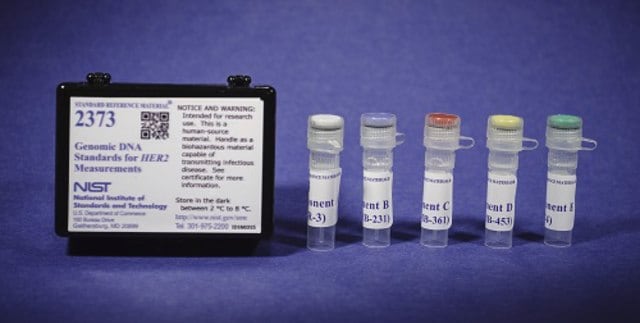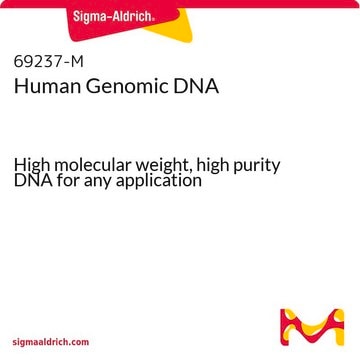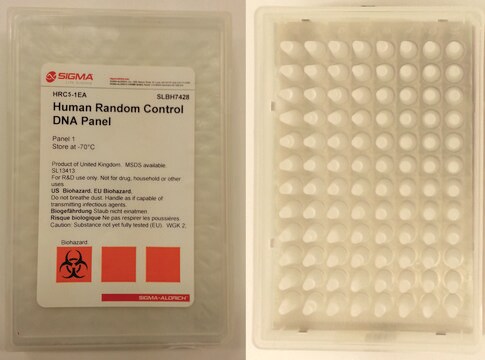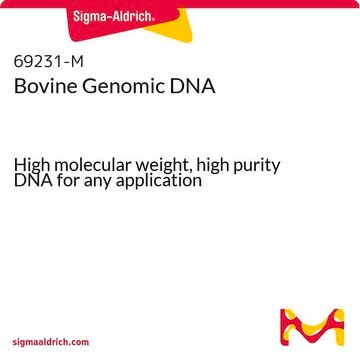11691112001
Roche
Human Genomic DNA
from human blood (buffy coat)
Synonym(s):
dna, human, homo sapiens dna
Sign Into View Organizational & Contract Pricing
All Photos(1)
About This Item
UNSPSC Code:
41106310
Recommended Products
biological source
human blood
Quality Level
form
solution
packaging
pkg of 100 μg
manufacturer/tradename
Roche
concentration
0.2 mg/mL
color
colorless
solubility
water: miscible
storage temp.
2-8°C
Related Categories
General description
DNA is composed of units called nucleotides arranged into two long polynucleotide chains, resulting in a double helical structure. Nucleotides contain a phosphate group, a sugar group and a nitrogen base. There are four types of nitrogen bases namely adenine (A), thymine (T), guanine (G) and cytosine (C). The arrangement of these bases establishes the genetic codon. The difference in the nucleotide sequences is the reason why organisms differ from one another. In eukaryotic cell, the DNA is localized to the nucleus.
High molecular weight (>50kb) genomic DNA isolated from human blood (buffy coat) by the method of Sambrook et al..
Application
Human Genomic DNA is suitable for:
- Southern hybridization analysis
- genomic library construction
- the amplification of large DNA targets by the Expand System
- to assess the quality or integrity of DNA sample using qPCR or real time (RT) PCR and as a control during DNA sequencing
Biochem/physiol Actions
DNA is an essential component of the mechanism for heredity. The nucleotide sequences carry information regarding different biological processes. The genetic codons encode proteins essential for biological function. This genetic information is transmitted to the next generation during cell division. The amplification of very long fragments of genomic DNA requires template DNA of very high quality. In some cases, amplification failure may be due to poor template quality. This particular quality of genomic DNA is prepared to ensure reliable amplification of long DNA fragments.
Quality
Molecular weight: The preparation is electrophoretically separated on a 0.5% agarose gel and the gel is stained with ethidium bromide. The molecular weight of the purified genomic DNA is greater than 50kb.
Function test: The preparation is used as template in a PCR with the Expand PCR System and appropriate primers from the human tPA Control Primer Set. Amplification products up to 27kb long are obtained.
Absence of contaminating organisms: The serum used for this preparation was tested for HBs antigen and the presence of antibodies to HIV-1, HIV-2, HCV. All tests were negative.
Function test: The preparation is used as template in a PCR with the Expand PCR System and appropriate primers from the human tPA Control Primer Set. Amplification products up to 27kb long are obtained.
Absence of contaminating organisms: The serum used for this preparation was tested for HBs antigen and the presence of antibodies to HIV-1, HIV-2, HCV. All tests were negative.
Physical form
Solution in 10 mM Tris HCl, 1 mM EDTA, pH 8.0
Other Notes
For life science research only. Not for use in diagnostic procedures.
Disclaimer
RESEARCH USE ONLY. This product is regulated in France when intended to be used for scientific purposes, including for import and export activities (Article L 1211-1 paragraph 2 of the Public Health Code). The purchaser (i.e. enduser) is required to obtain an import authorization from the France Ministry of Research referred in the Article L1245-5-1 II. of Public Health Code. By ordering this product, you are confirming that you have obtained the proper import authorization.
Storage Class Code
12 - Non Combustible Liquids
WGK
nwg
Flash Point(F)
No data available
Flash Point(C)
No data available
Certificates of Analysis (COA)
Search for Certificates of Analysis (COA) by entering the products Lot/Batch Number. Lot and Batch Numbers can be found on a product’s label following the words ‘Lot’ or ‘Batch’.
Already Own This Product?
Find documentation for the products that you have recently purchased in the Document Library.
Customers Also Viewed
Sinden RR, et al.
DNA (2012)
miR-29 acts as a decoy in sarcomas to protect the tumor suppressor A20 mRNA from degradation by HuR.
M Y Balkhi et al.
Science signaling, 6(286), ra63-ra63 (2013-08-01)
In sarcoma, the activity of NF-κB (nuclear factor κB) reduces the abundance of the microRNA (miRNA) miR-29. The tumor suppressor A20 [also known as TNFAIP3 (tumor necrosis factor-α-induced protein 3)] inhibits an upstream activator of NF-κB and is often mutated
L M Rice et al.
Journal of applied microbiology, 115(3), 818-827 (2013-06-19)
The goal of this study was to develop a molecular diagnostic multiplex assay for the quantitative detection of microbial pathogens commonly responsible for ventilator-associated pneumonia (VAP) and their antibiotic resistance using linear-after-the-exponential polymerase chain reaction (LATE-PCR). This multiplex assay was
Alberts B, et al.
Molecular Cell Biology. 4th edition. (2002)
Claire Rooney et al.
PloS one, 11(2), e0149628-e0149628 (2016-02-26)
FGFR1 amplification occurs in ~20% of sqNSCLC and trials with FGFR inhibitors have selected FGFR1 amplified patients by FISH. Lung cancer cell lines were profiled for sensitivity to AZD4547, a potent, selective inhibitor of FGFRs 1-3. Sensitivity to FGFR inhibition
Our team of scientists has experience in all areas of research including Life Science, Material Science, Chemical Synthesis, Chromatography, Analytical and many others.
Contact Technical Service









